Products
Agilent's model 7500cx collision cell ICP-MS system uses pure helium as the collision gas. According to the company, the system is capable of eliminating or reducing all polyatomic interferences in any matrix under a single set of generic conditions.
ICP-MS system
Agilent's model 7500cx collision cell ICP-MS system uses pure helium as the collision gas. According to the company, the system is capable of eliminating or reducing all polyatomic interferences in any matrix under a single set of generic conditions. Fitting the instrument with an optional high matrix introduction system reportedly enables the analysis of unknown samples containing dissolved solids at 1% and above. Agilent Technologies, Inc., Santa Clara, CA;
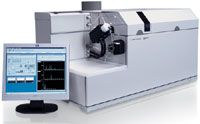
Bench-top NMR reader
The HyperQuant bench-top NMR reader from Bruker BioSpin is designed to quantify a sample's magnetic hyperpolarization and thermal polarization. According to the company, the instrument applies time-domain nuclear magnetic resonance spectroscopy. The instrument uses a permanent magnet and NMR pulse sequences to enable the quantification of the thermal polarization of 13 C-labeled samples with volumes as low as 1 mL. Bruker BioSpin, Nice, France;
www.bruker-biospin.com/hyperquant
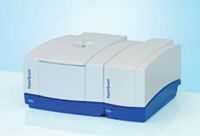
Portable Raman instrument
The portable EZRaman-I instrument from Enwave is designed to provide approximately 50 times better sensitivity than most other portable Raman instruments. According to the company, the instrument's spectral resolution is approximately 6 cm-1 and its spectral range is 100–2000 cm-1. Enwave Optronics, Inc., Irvine, CA;
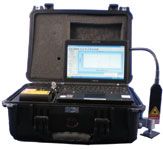
Fiber-optic accessories
The Omni-Diff and Omni-Spec diffuse and specular reflection fiber-optic accessories from Harrick Scientific connect via 1.5-m cables to the company's FiberMate 2 interface installed in a spectrometer. According to the company, selection of the appropriate fiber cables allows operation in wavelength regions ranging from UV to the mid-infrared. An optional USB-compatible camera is available. Harrick Scientific Products, Pleasantville, NY;

Miniature spectrometer
Avantes' miniature AvaSpec-128 spectrometer detector includes a cylindrical collection lens that reportedly improves sensitivity by a factor of 4. The lens focuses the light onto the instrument's detector array, which has a pixel height of 63.5 μm. The instrument is available for the 350–1100 nm wavelength range. The spectrometer is designed for inline process control applications and can be used for NIR applications such as fruit sorting and water detection. Avantes Inc., Broomfield, CO;
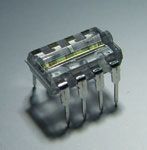
Material identification system
DeltaNu's ReporteR material identification system is designed for rapid and nondestructive testing. The system reportedly weighs less than 11 oz and can identify unknown substances in seconds. Applications include forensic science, recycling facilities, emergency response, and law enforcement. DeltaNu, Inc., Laramie, WY;
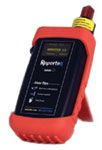
Electron backscatter detector
The DigiView IV electron backscatter detector from EDAX is designed to obtain orientation mapping data at rates up to 150 indexed patterns per second and can be used for phase identification using the company's Genesis and Delphi software. The detector uses a bellows-based insertion and retraction system for operation while under vacuum and for live-imaging. Other applications include determination of crystal orientation, grain size, and boundary information. EDAX Inc., Mahwah, NJ;
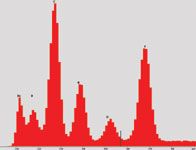
Reference materials catalog
Inorganic Ventures introduces its 2008–2009 catalog of stocked certified reference materials, featuring standards for ICP, ICP-MS, IC, AA, wet chemistry, and the latest EPA methods. According to the company, products are color-coded by application and indexed by both catalog number and subject. Inorganic Ventures, Lakewood, NJ;
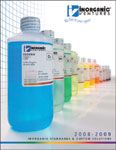
Fluorescence lifetime system
The TemPro fluorescence lifetime system from HORIBA Jobin Yvon uses time-correlated single photon counting for measuring fluorescence lifetimes ranging from picoseconds to seconds. The instrument includes a USB 2.0 interface for data transfer and interchangeable pulsed laser diode and LED light sources that cover discrete emission wavelengths from 255 nm to the near-IR range. Options include light sources, polarizers, and extended detection to 850 nm. HORIBA Jobin Yvon, Edison, NJ;
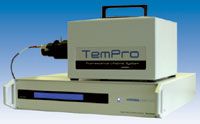
X-ray microanalysis system
The Genesis Apex X-ray microanalysis system from EDAX includes the company's Apollo silicon drift detector and a digital pulse processor designed to provide a clean spectrum and processing times of greater than 1,000,000 cps. The system also includes the company's Expert ID software for element identification. EDAX, Inc., Mahwah, NJ;
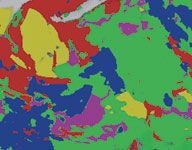
Diamond ATR accessory
The GladiATR diamond ATR accessory from PIKE is available with a liquid crystal sample display that is designed to enable visualization of features from opaque and transparent samples. According to the company, the accessory provides high energy throughput and a wide spectral range and is compatible with most FT-IR spectrometers. PIKE Technologies, Madison, WI;
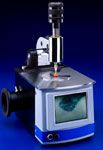
High-voltage vacuum feedthrough
The Micro Midgy feedthrough from Insulator Seal has a 12-kV rating and comprises a ceramic device less than 1 in. in length. According to the company, the feedthrough uses an air-exclusion, air-side connector. Multiple flange configurations are available as standard catalog items, and custom configurations are available on request. Insulator Seal, a division of MDC Vacuum Products, LLC, Sarasota, FL;
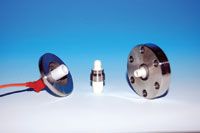
Spectrometer modules
Zeiss MMS modules from Hellma USA are optical sensors covering the 190–2200 nm wavelength range. The modules consist of an input fiber, which reportedly acts as cross-section converter, permanently positioned holographic grating, and diode array. According to the company, the units are permanently factory calibrated and are temperature stable. Applications include medical, color, process control, and portable field measurements. Hellma USA, Plainview, NY;
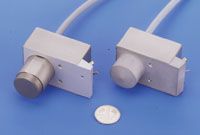
ICP–AES system
The ACTIVA-S ICP–AES system from HORIBA Jobin Yvon features a spectroscopic quality CCD covering the 160–800 nm spectral range. The system's SMARTVIEW function is designed to provide a rapid and accurate semiquantitative image of a sample through automatic and reprocessable calculations. According to the company, the system can be used for petrochemistry and agricultural applications such as biofuel or fertilizer analysis. HORIBA Jobin Yvon, Inc., Edison, NJ;
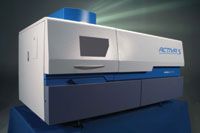
FT-IR microscopes
JASCO's FT-IR microscopes include the model IRT-5000, which features dual-detector capability and multiple objectives, and the model IRT-7000, a multichannel IR microscope for IR imaging. According to the company, the latter microscope combined with the company's model FT/IR-6000 spectrometer enables dynamic imaging and time-resolved measurements of a specific area. JASCO, Easton, MD;

Vis-NIR fluorescence probe
The model QF600-8-VIS/NIR fluorescence probe from Ocean Optics is designed to eliminate back reflection from excitation radiation. The probe uses one flat fiber for detection and seven angled fibers that direct excitation energy to the region in front of the detection fiber. According to the company, the design results in a greater fluorescence signal than with a traditional probe design. Ocean Optics, Inc., Dunedin, FL;
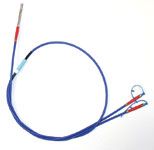
Handheld XRF instrument
Bruker's TRACERturboSD handheld X-ray fluorescence instrument include's the company's Xflash silicon drift detector. The unit is designed to provide fast analysis of sophisticated metals such as light element alloys without the use of a vacuum or helium attachment. Bruker AXS, Kennewick, WA;
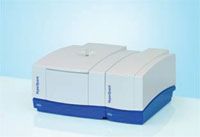
NIR lens spectrograph
Princeton Instruments' LS 785 NIR lens spectrograph is designed for Raman and fluorescence applications requiring high throughput. The spectrograph is available in three configurations and includes the company's PIXIS deep-depletion CCD camera and the Acton Series LS 785 spectrograph. Princeton Instruments, Trenton, NJ;
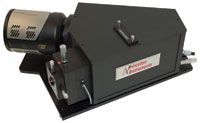
ICP system
Shimadzu's simultaneous ICPE-9000 system features an Echelle grating system under vacuum conditions and a mini torch that reportedly reduces consumption of argon gas to half that of conventional torches. The system also includes a large-scale, 1-in., 1-megapixel CCD detector. The system is designed for high-speed measurement over extended periods. Shimadzu Scientific Instruments, Inc., Columbia, MD;
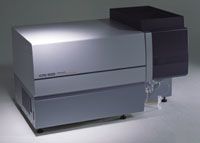
Spectrometers
BLUE-Wave spectrometers from StellarNet measure in the UV–vis–NIR wavelength range 190–1150 nm. According to the company, 15 models are available in configurations for various spectral ranges and resolutions with dispersive optics imaging to a 2048-element CCD detector array. The instruments have SMA-905 fiber-optic input with a high-speed USB-2 computer interface. An integrated 16-bit digitizer and spectral memory reportedly provide a signal-to-noise ratio of 1000:1 with conversion times down to 1 ms. StellarNet, Inc., Tampa, FL;
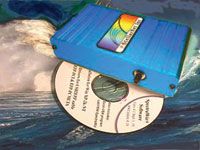
EDXRF spectrometer
PANalytical's MiniPal 4 Sulfur energy dispersive X-ray fluorescence spectrometer is designed for analyzing sulfur in diesel fuels and for quality control and ensuring compliance with international regulations. The spectrometer includes a 15-kV silver anode tube and a silicon drift detector. According to the company, the instrument's software automatically selects the best calibration relative to the sulfur content of an unknown sample. PANalytical, Almelo, The Netherlands;
www.panalytical.com/minipal4sulfur
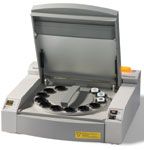
Planetary ball mill
Retsch's Planetary Ball Mill PM 100 CM features a centrifugal mode that reportedly results in a gentle grinding process with less temperature rise in the material and less wear on the grinding set. The mill is designed to reduce hard, fibrous, and soft materials to the low micrometer range. Retsch, Inc., Newtown, PA;

Biodiesel standards
SPEX CertiPrep's B100 biodiesel standards are designed to meet the requirements of ASTM methods D6751, D5453, and EN14214. Products include certified B100 blanks, sulfur in B100, and Ca, K, Mg, Na, and P in B100. According to the company, all standards are supplied with a certificate of analysis and materials safety data sheets. Custom standards are also available. SPEX CertiPrep, Inc., Metuchen, NJ;
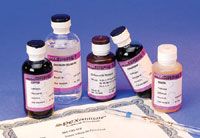
Mercury analyzer
The Hydra-C mercury analyzer from Teledyne Leeman Labs permits the direct analysis of solid samples by combustion. According to the company, the instrument is designed for analysts wanting to use EPA Method 7473 or to determine mercury without prior sample digestion. The instrument has a 25-cm optical path and a self-registering autosampler that reportedly allows unrestricted rotation during sample loading. Oxygen is used only as a carrier gas and not for pneumatic actuation. Teledyne Leeman Labs, Hudson, NH;
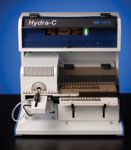
FT-IR spectrometer
The Nicolet iS10 FT-IR spectrometer from Thermo Fisher Scientific is designed to simplify data analysis, sampling, and instrument validation. The instrument's OMNIC Specta software reportedly enables users to identify individual components in a mixture from a single spectrum in one step. According to the company, a spectral performance verification feature monitors the accuracy and performance of the spectrometer on a regular basis. Instrument checks can be performed overnight. An optional module allows two accessories to be installed at the same time. Thermo Fisher Scientific, Madison, WI;
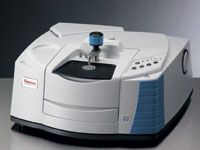
3-D imaging and AFM system
WITec's alpha500 system combines confocal Raman microscopy for 3-D chemical imaging with atomic force microscopy for high-resolution structural imaging. The automated system includes a motorized sample stage that allows multiarea, multipoint measurements and overview scans on an arbritrary, user-defined number of measurement points. Automated functions include integrated autofocus and an automatic AFM-tip approach. WITec GmbH, Ulm, Germany;

Peristaltic pump tubing
Flared-end peristaltic pump tubing from Glass Expansion is designed to facilitate installation for all applications and solvents. The flared end of the tubing reportedly allows larger samle capillary tubing to be inserted. The tubing is intended for use in ICP-OES and ICP-MS applications. Glass Expansion, Inc., Pocasset, MA;

Mercury analyzer
The Model RA-3000 Gold+AFS mercury analyzer from Nippon Instruments Corporation is designed for EPA Method 1631E, which allows for the determination of mercury at a minimum level of 0.5 parts-per-trillion in water. According to the company, the analyzer simplifies low to sub-parts-per-trillion mercury analysis. Nippon Instruments North America, College Station, TX;
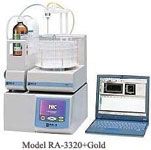
NIR spectroscopy website
Thermo Fisher Scientific's NIR spectroscopy website is designed to serve as a comprehensive point of reference for all NIR spectroscopy users. The website provides detailed descriptions of various applications, theory, and experimental examples. Other features include a learning center with interactive tools such as an "ask the experts" option, a news and events section, and a comprehensive list of answers to previously submitted questions. Thermo Fisher Scientific, Madison, WI;
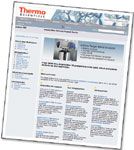
Element identification software
EDAX's Expert ID software is designed with a background fitting routine to provide accurate element identification in one step. The software's physics-and rules-based algorithm reportedly enables increased peak identification accuracy. According to the company, the software uses an interactive process and enables users to perform quantitative analysis and to generate maps. EDAX, Inc., Mahwah, NJ;
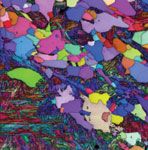
Microplate adaptor
The Reference Cell Micro-plate Adaptor (RCMA) from Starna is designed to enable the use of the company's existing sealed-cell and filter reference materials in a horizontal format. The adaptor reportedly allows the location of eight pairs of read positions and minimizes the potential for bubble interference with measurements. According to the company, the adaptor enables users to compare microplate reader data against measurements performed on a conventional spectrophotometer. Starna Cells, Inc., Atascadero, CA;
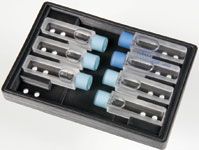
Imaging software
Andor Technology's Komet 6.0 software is designed for imaging and analysis of comet assay specimens. The software is supplied with the company's Database Viewer standalone review tool, which reportedly provides specimen decoding, visualization, and data preparation for subsequent statistical analyses. According to the company, the comet assay reveals DNA damage at the single-cell level. Andor Technology plc, Belfast, UK;

ATR accessory
PerkinElmer's Universal Attenuated Total Reflection Polarization accessory is designed to provide users with the benefits of combining IR spectroscopy with a polarizer. According to the company, the accessory can be used for applications such as crystal structure studies, polymer and fiber orientation studies, and structural analysis studies of biomolecules such as proteins. The variable angle polarizer can be removed for nonpolarized measurements. PerkinElmer, Waltham, MA;
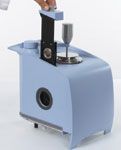
Reaction analysis system
Mettler-Toledo's ReactIR 45m reaction analysis system includes the MultiplexIR accessory, which allows the system to monitor two independent reactions simultaneously. The instrument features sealed optics, software-driven x and y detector alignment, a simplified detector height adjustment, and as many as four RTD, temperature monitor, inputs for real-time trending with IR data. Mettler-Toledo, Inc., Columbus, OH;

Long-wavelength NIR Raman spectrograph
The Nunavut long-wavelength NIR Raman spectrograph from BaySpec is designed to replace bulky, slow FT-IR systems. The system features a dispersive f/2 design with no moving parts. According to the company, the spectrograph can be used for measuring biological and tissue samples at 1064 nm, avoiding high fluorescent background at 785 nm. The instrument's spectral resolution reportedly is 8 cm-1 with spectral coverage up to 3300 cm-1. BaySpec, Inc., Fremont, CA;
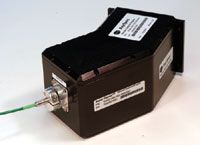
Resistive glass drift tubes
Resistive glass drift tubes from PHOTONIS are designed for ion mobility spectrometry applications. The tubes feature single-piece construction and are intended for use in place of stack assemblies with metal and ceramic annular components. According to the company, the tubes provide more uniform electric fields and improve the performance and reliability compared with traditional methods. PHOTONIS USA, Inc., Sturbridge, MA;
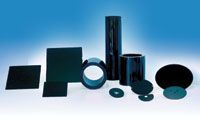
Micro-XRF spectrometer
EDAX's Orbis micro X-ray fluorescence elemental analyzer system incorporates a motorized turret that integrates video and X-ray optics to allow coaxial sample view and X-ray analysis. Two additional X-ray collimators can be added to the optical turret. The system is available with mono-or polycapillary optics. The spectrometer is designed for elemental analyses of small samples such as particles, fragments, and inclusions and automated multipoint and elemental imaging analysis on larger samples. EDAX, Inc., Mahwah, NJ;
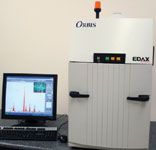
Raman website
A noncommercial website for Raman information exchange, www.RamanWeb.net, is now available for informal discussion of ideas without the formalism of publishing. The website comprises an unmonitored users' forum, a blog, a Raman news feed, and links to useful websites.

Thin film measurement system
The Thin Film System is designed for in-situ and in-line measurements of film structures, including single and multilayer, freestanding, rough, and both thick and thin layer structures. The ThinFilmCompanion software offers real-time spectral capture and instrument control for reflectance or transmittance. StellarNet, Inc., Tampa, FL;
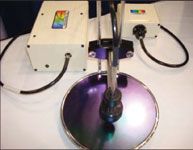
Silicon drift detector
The XR-100SDD Silicon Drift Detector (SDD) from Amptek reportedly enables extremely high count rate applications with high energy resolution. According to the company, the product is designed for XRF applications from OEM handheld instruments to benchtop analyzers. Amptek, Inc., Bedford, MA;

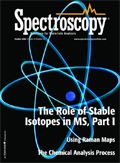
LIBS Illuminates the Hidden Health Risks of Indoor Welding and Soldering
April 23rd 2025A new dual-spectroscopy approach reveals real-time pollution threats in indoor workspaces. Chinese researchers have pioneered the use of laser-induced breakdown spectroscopy (LIBS) and aerosol mass spectrometry to uncover and monitor harmful heavy metal and dust emissions from soldering and welding in real-time. These complementary tools offer a fast, accurate means to evaluate air quality threats in industrial and indoor environments—where people spend most of their time.
NIR Spectroscopy Explored as Sustainable Approach to Detecting Bovine Mastitis
April 23rd 2025A new study published in Applied Food Research demonstrates that near-infrared spectroscopy (NIRS) can effectively detect subclinical bovine mastitis in milk, offering a fast, non-invasive method to guide targeted antibiotic treatment and support sustainable dairy practices.
Smarter Sensors, Cleaner Earth Using AI and IoT for Pollution Monitoring
April 22nd 2025A global research team has detailed how smart sensors, artificial intelligence (AI), machine learning, and Internet of Things (IoT) technologies are transforming the detection and management of environmental pollutants. Their comprehensive review highlights how spectroscopy and sensor networks are now key tools in real-time pollution tracking.